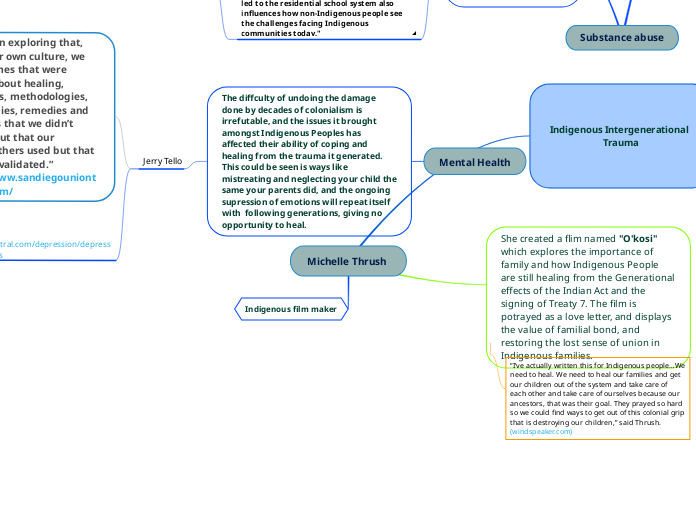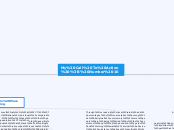Cultural Revitilization
Alicia Dubois
“The way in which we share and learn from the truths and lived experiences of our past is fundamental to how we build our future and strengthen the fabric of our communities.” https://news.gov.bc.ca/
Autumn Cooper
“The power you feel learning your language, there are no words for it, you feel so much more connected to your culture in so many ways because of your language." https://news.gov.bc.ca/
Mental Health
The diffculty of undoing the damage done by decades of colonialism is irrefutable, and the issues it brought amongst Indigenous Peoples has affected their ability of coping and healing from the trauma it generated. This could be seen is ways like mistreating and neglecting your child the same your parents did, and the ongoing supression of emotions will repeat itself with following generations, giving no opportunity to heal.
Jerry Tello
https://psychcentral.com/depression/depression-in-indigenous
"Untreated postpartum depression can have serious consequences for both parents and children. New parents might fear revealing their symptoms will lead to the loss of their child. Instead, they might turn inward, coping through self-harm or emotional distancing."
“We began exploring that, within our own culture, we had volumes that were written about healing, constructs, methodologies, philosophies, remedies and traditions that we didn’t know about that our grandmothers used but that were not validated.” https://www.sandiegouniontribune.com/
Substance abuse
"That anger and that resentment that I beared towards my parents, it really, really was very destructive and it led me down a road of heavy, heavy, heavy drinking and I ended up on the streets in Vancouver," https://www.cbc.ca/news/health/residential-schools
"Patricia Vickers is a teacher, artist, psychotherapist and director of mental wellness at the First Nations Health Authority. As someone who faced the intergenerational trauma of residential schools, Patricia says it was very difficult to find the right support when she needed it. She highlighted that the discrimination that led to the residential school system also influences how non-Indigenous people see the challenges facing Indigenous communities today."
“When I was in therapy 20 or 25 years ago, I had to look a long way to find people who had any understanding of Indigenous history and its impact,” Patricia says. “The colonial rhetoric is still alive and well, which is the idea that we have violence in our families and communities because we’ve been conditioned to believe we’re less than human, or inferior, as Indigenous Canadians.
https://www.stopoverdose.gov.bc.ca/
Adam North Peigan
Trauma manifests in various ways, and each person has their own method of coping. It is commonly found that Indigenous Peoples have (and continue) to cope with their trauma through drugs and alchohol consumption, which leads to consequences like incarceration and bad health.
https://substanceabusepolicy.biomedcentral.com/
"Like other Indigenous people around the world, First Nations, Métis, and Inuit face significant challenges with trauma – cumulative throughout an individual’s life, as well as collective (encompassing that experienced by one’s family, community, nation- as well as the surrounding natural world) and intergenerational – that leads to substance use and Addiction."
Michelle Thrush
Indigenous film maker
She created a flim named "O'kosi" which explores the importance of family and how Indigenous People are still healing from the Generational effects of the Indian Act and the signing of Treaty 7. The film is potrayed as a love letter, and displays the value of familial bond, and restoring the lost sense of union in Indigenous families.
“I’ve actually written this for Indigenous people…We need to heal. We need to heal our families and get our children out of the system and take care of each other and take care of ourselves because our ancestors, that was their goal. They prayed so hard so we could find ways to get out of this colonial grip that is destroying our children,” said Thrush. (windspeaker.com)
Indigenous Intergenerational Trauma
Many Indigenous communities across Canada have been impacted by the effects of systemic discrimination that's been passed on through generations. The residual impact left from the Residential School system continues to affect Indigenous Peoples way of being. From our education and justice system to the cultural assimiliation forced upon them, Indigenous communitites have suffered greatly.
What I know









